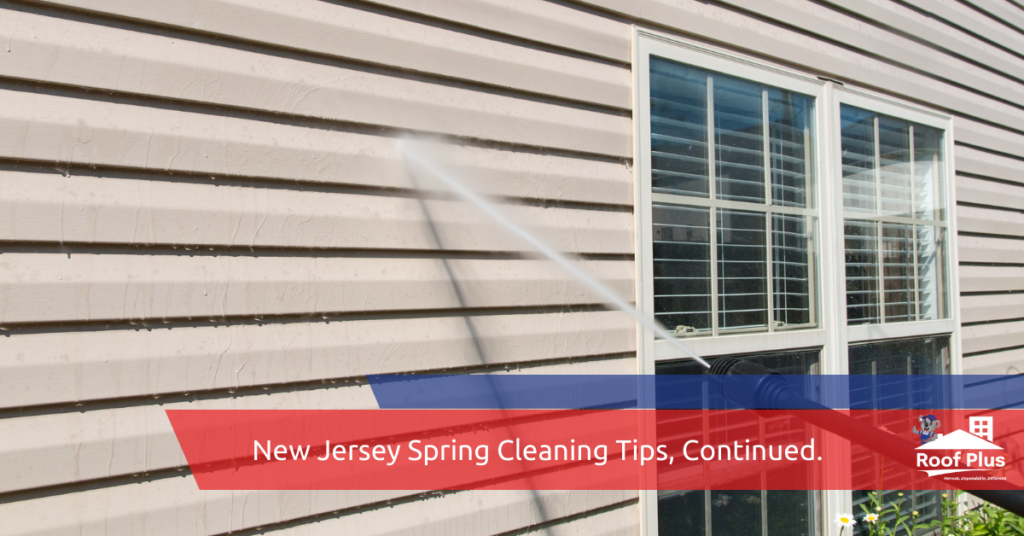Our Blog

New Jersey Spring Cleaning Tips, Continued
In our last post, we offered our readers a few pointers with regards to spring roof maintenance tips in New Jersey. Among the tips were the advice about how to clean your gutters in addition to a reminder about how important it is to clear out your gutters fairly frequently. One particular point we’d like to reiterate from that previous post is for our clients, and really, anyone who is reading this, to make sure to look out for an excess of shingle granules in your gutters. Why are shingle granules and why does this matter? Two excellent questions. The first answer is that shingle granules, sometimes called shingle sediment, are made up of a grit that separate the roof surface from asphalt shingles. Although it’s quite natural for granule loss from shingles to occur, you don’t want too much of said sediment building up in your gutters. These granules have three primary purposes: to protect the asphalt shingles from UV rays, to add color and character, and to offer a fire-resistant quality.
Although you probably do not need to fix or replace your roof from a typical amount of shingle loss, you don’t want this “fall-off”, as we say in the business, to grow too much. However, if you have an exceptionally old roof, your shingles might have lost a requisite amount of protective sediment to warrant a roof replacement. The granules, as strange as it seems, provide an important layer of protection. Your shingles will deteriorate much more quickly without said granules.
If you have questions about how much fall-off is too much fall-off, we’d be happy to take a look for you at Roof Plus! We serve Brielle, Wall Township, Spring Lake, Brick, Sea Girt, as well as up and down the entire New Jersey coast! In fact, we are happy to offer folks looking for roofing services with a free roof analysis! So whether you are looking for seasoned eyes to take a look at your fall-off/granule situation or you need commercial roof repair, we’ve got you covered at Roof Plus we affordable and high-quality roofing and siding services!
But we must digress, as we have a promised blog topic to get to today. There are other spring roofing maintenance tips to get to that we didn’t get the chance to cover in our last post. So keep reading if you are interested in a more thorough guide to spring cleaning and maintenance!
Spring Cleaning For Your Windows, Siding, And Roof
Let’s start with your windows. Although you can use a store-bought solution, sometimes you need something with a little more kick to get windows with a few season’s worth of gunk and grime on them to really do the trick. We recommend using a solution comprised of baby shampoo, with a ratio in the range of a teaspoon to tablespoon for every gallon of water. You can also use vinegar, usually 1-2 cups of vinegar to one gallon of water, which should do the trick.
And although many people recommend using newspaper, it can easily stain white vinyl. We recommend going with a regular cloth or goold old-fashioned paper towels.
What Is The Best Way To Clean My Siding?
If you are looking to washing your siding this spring, consider using a solution of bleach and water. Find the balance that is right for you, but we recommend ballparking it around 1 teaspoon of bleach for every gallon of water.
If you are like some homeowners, you might not want to use a chlorine-based bleach, but would prefer oxygen bleach. While the oxygen bleaches aren’t quite as effective on mildew, it’s not as harsh on your siding and deck surfaces. A balance must be found.
Roof Cleaning Tips
Here are a few more roof maintenance tips we think you’ll find helpful this spring.
- Don’t let tree limbs ever touch your roof. As we noted above, you want to diminish the fall-off as much as possible, as it will extend the lifespan of your roof. Trim any tree limbs near your roof.
- Mold can be an issue to keep an eye out for as well. But how do you tell what is actual mold? Usually, you’ll see some kind of discoloration in the form of streaks on your roof. That might means that there is mold, fungus, or algae of some kind that can go to town on your roofing material. This could lead to leaks. Luckily, you probably don’t even need to hire a roofing contractor to solve this problem. All you’ll need is to treat the problem with chlorine bleach or copper sulfate to kill the mold! Of course, you can also get mold-resistant shingles in the first place, so be sure to ask us about that the next time you are in need of a roof replacement!
Reach out to us today for any and all roofing repair or replacement needs!


